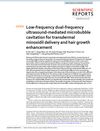 August 2024 in “Indian Journal of Skin Allergy”
August 2024 in “Indian Journal of Skin Allergy” Stem-cell therapy shows promise for skin conditions but needs more research.
 2 citations,
March 2015 in “Expert opinion on orphan drugs”
2 citations,
March 2015 in “Expert opinion on orphan drugs” New treatments for hair loss show promise but need more research to confirm safety and effectiveness.
 19 citations,
March 2008 in “Nature clinical practice endocrinology & metabolism”
19 citations,
March 2008 in “Nature clinical practice endocrinology & metabolism” A combined drug and laser treatment improved hirsutism in a PCOS patient, also enhancing her heart health and requiring regular liver and kidney checks.
 10 citations,
January 2014 in “Journal of Mid-life Health”
10 citations,
January 2014 in “Journal of Mid-life Health” Menopause can cause skin issues, and seeing a dermatologist helps.
 33 citations,
September 2019 in “Dermatologic Surgery”
33 citations,
September 2019 in “Dermatologic Surgery” Using a special stem cell formula on the scalp once a month for six months helped people with hair loss grow more hair.
 1 citations,
July 2017 in “Clinical research in dermatology”
1 citations,
July 2017 in “Clinical research in dermatology” Hair loss, known as Androgenetic Alopecia, is often caused by hormones and can be diagnosed using noninvasive techniques. Treatments include topical minoxidil and oral finasteride, with new treatments being explored. There may also be a link between this type of hair loss and heart disease risk.
 9 citations,
October 2018 in “Journal of Cosmetic and Laser Therapy”
9 citations,
October 2018 in “Journal of Cosmetic and Laser Therapy” Using methods like lasers and microneedling with drugs can improve hair regrowth for alopecia, but more research is needed on safety and best practices.
 159 citations,
March 2014 in “Journal of The American Academy of Dermatology”
159 citations,
March 2014 in “Journal of The American Academy of Dermatology” Some skin medications are safe during pregnancy and breastfeeding, but others can harm the baby and should be avoided.
 1 citations,
September 2023 in “Stem cell research & therapy”
1 citations,
September 2023 in “Stem cell research & therapy” Mesenchymal stem cells could help treat aging-related diseases better than current methods.
 43 citations,
February 2020 in “Clinica chimica acta”
43 citations,
February 2020 in “Clinica chimica acta” Nano-sized plant-based chemicals could improve cervical cancer treatment by being more effective and causing fewer side effects than current methods.
 January 2022 in “Springer eBooks”
January 2022 in “Springer eBooks” The document discusses how to diagnose and treat conditions like acne, excessive hair growth, and female pattern hair loss related to hormone imbalances.
 20 citations,
December 2016 in “American Journal of Clinical Dermatology”
20 citations,
December 2016 in “American Journal of Clinical Dermatology” Men prefer less invasive cosmetic procedures and need different treatment approaches than women.
 February 2024 in “Actas Dermo-Sifiliográficas”
February 2024 in “Actas Dermo-Sifiliográficas” Dermatologists recommend oral dutasteride for male hair loss, low-dose oral minoxidil for female hair loss, and a multidisciplinary approach for young patients, with caution during pregnancy.
182 citations,
November 2018 in “Cosmetics” Seaweeds have beneficial compounds for skin care, including anti-aging and protective effects.

Isotretinoin may cause temporary, reversible facial hair growth in some women.
 20 citations,
June 2017 in “Hormone Molecular Biology and Clinical Investigation”
20 citations,
June 2017 in “Hormone Molecular Biology and Clinical Investigation” Long-term use of dutasteride for enlarged prostate may worsen blood sugar, cholesterol, and erectile dysfunction.
 4 citations,
July 1996 in “Annals of Internal Medicine”
4 citations,
July 1996 in “Annals of Internal Medicine” High doses of fluconazole can cause reversible hair loss.
 4 citations,
February 2011 in “Nature Reviews Endocrinology”
4 citations,
February 2011 in “Nature Reviews Endocrinology” Metformin and thiazolidinediones are similarly effective for PCOS, but metformin is often preferred due to fewer side effects.
 11 citations,
May 2021 in “Dermatologic clinics”
11 citations,
May 2021 in “Dermatologic clinics” PRP and cell therapies may help with hair loss, but more research is needed.
 18 citations,
February 2010 in “Odontology”
18 citations,
February 2010 in “Odontology” The document concludes that Rabson-Mendenhall syndrome requires novel treatments for insulin resistance and emphasizes the importance of dental care in affected patients.
 4 citations,
June 2013 in “The Journal of Rheumatology”
4 citations,
June 2013 in “The Journal of Rheumatology” The document concludes that various findings in rheumatology offer insights into disease severity, treatment responses, and potential risks in medication, with some limitations due to unspecified participant numbers.
 88 citations,
January 2011 in “Annals of Dermatology”
88 citations,
January 2011 in “Annals of Dermatology” The document concludes that specific itchy skin diseases during pregnancy have varying fetal risks and treatments, including corticosteroids and other medications.
 1 citations,
October 2010 in “Series in cosmetic and laser therapy”
1 citations,
October 2010 in “Series in cosmetic and laser therapy” Mesotherapy is a minimally invasive treatment with potential benefits and risks, requiring standardized practices and further investigation.
 19 citations,
October 2020 in “Biomedical Microdevices”
19 citations,
October 2020 in “Biomedical Microdevices” Derma rollers show promise for skin improvement and drug delivery, but more research is needed on their safety and effectiveness.
 14 citations,
March 2020 in “Scientific Reports”
14 citations,
March 2020 in “Scientific Reports” Using dual-frequency ultrasound with microbubbles can potentially improve the delivery of hair growth treatment through the skin and enhance hair growth.
 17 citations,
July 2014 in “Journal of Ultrasound in Medicine”
17 citations,
July 2014 in “Journal of Ultrasound in Medicine” Abnormal cuticle and hair shaft medulla cause hair loss in androgenetic alopecia; sonography helps diagnose and manage it.
 3 citations,
January 2024 in “Signal transduction and targeted therapy”
3 citations,
January 2024 in “Signal transduction and targeted therapy” Lymphatic vessels are essential for health and can be targeted to treat various diseases.
 15 citations,
January 2016 in “Journal of cell science & therapy”
15 citations,
January 2016 in “Journal of cell science & therapy” Using a patient's own tissue for micro-grafts may effectively treat non-healing leg ulcers and relieve pain.
 41 citations,
December 2017 in “Lasers in Medical Science”
41 citations,
December 2017 in “Lasers in Medical Science” Low-Level Laser Therapy (LLLT) is a safe and effective treatment for common hair loss, but more research is needed to find the best power and wavelength for treatment.
 11 citations,
January 2020 in “Dermatologica Sinica”
11 citations,
January 2020 in “Dermatologica Sinica” Tofacitinib helps regrow hair in severe alopecia patients, but more research is needed.





























